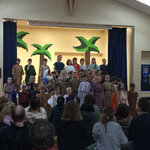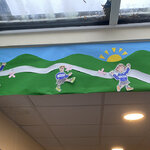Principles of our English Curriculum
Writing Curriculum Progression of Skills and Knowledge
Reading Curriculum
Intent
Our vision
At Holy Trinity we believe that all pupils should have the opportunity to be fluent, confident readers who are able to successfully comprehend and understand a wide range of texts. We want pupils to develop a love of reading, a good knowledge of a range of authors and be able to understand more about the world in which they live through the knowledge they gain from texts.
By the end of their time at our school, all children should be able to read fluently and confidently across the curriculum, in preparation for transition to their forthcoming secondary education and be able to solve future challenges in our ever-changing world. We do not put ceilings on what pupils can achieve in reading and we do not hold pre-conceptions about any pupils’ ability to make progress.
Why do we teach it in the way that we do?
We believe that fluency and understanding of reading requires more than one method and reading skills must be transferable to any subject and in any situation. High quality texts have been carefully selected for each Key Stage to broaden children’s depth of literature with the aim of widening vocabulary and cultural capital.
We understand the importance of parents and carers in supporting their children to develop both word reading and comprehension skills, and so we actively encourage strong home-school partnerships to support the teaching of reading. This enables parents and carers to understand how to enhance reading skills being taught in school through good quality texts.
Implementation
How do we implement our vision in our school?
We teach the aims and the objectives of the Early Years Framework (2021) and the National Curriculum (2014). At Holy Trinity the teaching of early reading begins in Early Years and progresses through into Key Stage 1 using the teaching sequence of Little Wandle Letters and Sounds.
Alongside the teaching of systematic synthetic phonics using Little Wandle Letters and Sounds, we teach the following skills of reading:
● Word reading
● Themes and Conventions
● Comprehension: clarify, monitor and summarise, select and retrieve, respond and explain
● Inference
● Language for effect
What does it look like in our classrooms?
Throughout the school day, teachers reference the skills of reading to remind children that the skills of reading are used across all subjects. This is done verbally and through a visual reminder in the classroom.
Guided Reading
Children in Reception and Year 1 (Autumn Term) build on their phonic skills through small group guided reading lessons. This progresses to whole class guided reading lessons in Year 1 (Spring and Summer Terms) to Year 6 using the following structure:
Lesson 1: vocabulary and first read through of the text
Lesson 2: model and apply good reading strategies and second-read-through of the text
Lesson 3: summarising and retrieval
Lesson 4: model skills and targeted questioning
Lesson 5: application of taught skills and interventions
Texts are carefully selected by the class teacher to match curriculum topics so children can improve their range of vocabulary and cultural capital through guided reading. We have updated, and will continue to update, our range of texts to include stories and authors from BAME cultures which is reflective of our diverse country.
Class Story
We firmly believe that children model their own reading from the examples from their class teachers and therefore story time is included throughout the school day.
Reading for Pleasure
‘To be lost in a book’ is what we intend for our children and therefore we promote the enjoyment of reading for pleasure. Children select books from the local library, school library or class libraries. This reading structure ensures children receive a broad range of stories under the following categories: archaic language, non-linear time sequences, narratively complex, figurative/symbolic text and resistant text.
Children can also choose from a range of non-fiction books, predominantly matched to curriculum topics.
Reading at home
We use the following reading schemes to support children’s reading at home:
|
|
Reading Scheme |
Reading Incentives |
|
Reception |
Big Cat Little Wandle phonic books |
Library visit, School Library weekly visit, Secret Reader Buddy Readers |
|
Key Stage 1 |
Big Cat Little Wandle phonic books |
Library visit, School Library weekly visit, Promotion of bedtime stories |
|
Lower Key Stage 2 |
Big Cat Little Wandle phonic books, Oxford Reading Tree |
Library visit, School Library weekly visit, |
|
Upper Key Stage 2 |
Big Cat Little Wandle books, Oxford Reading Tree Free Readers |
Library visit, School Library weekly visit, |
What does it look like around our school?
To implement a culture of reading across our school, we use the following systems:
- Weekly use of our school library
- Book week activities
- Reading Ambassadors
- Reading Buddies
- Library visits to local library
- Participation in the Chipping Norton Literary Festival
- Key Stage 1 Bedtime stories evenings
Impact
By the time children leave Holy Trinity, they enjoy reading and are competent readers who can recommend books to their friends including a range of fiction, non-fiction and poetry. They are confident to use a range of reading skills to read for pleasure and reference non-fiction texts for information to support curriculum learning.
Past Academic Achievement in reading
All reading results over the past 4 years have been above national or well-above national comparisons:
|
2018 |
2019 |
2020 |
2021 |
||||
|
Year 2 |
Year 6 |
Year 2 |
Year 6 |
Year 2 |
Year 6 |
Year 2 |
Year 6 |
|
79% |
79% |
84% |
86% |
80% |
93% |
80% |
97% |
How do we monitor and review the impact of reading at our school?
The reading subject leader uses the following lines of enquiry to assess the impact of the reading curriculum:
● Phonics Screening Check for all pupils in Year 1.
● End of Key Stage 1 and 2 assessment tests and comparisons against national results.
● Fluency and confidence when reading out loud and to an audience.
● Termly reading assessments.
● Discussions with pupils.
● Discussions with teachers.
● Learning behaviour in the classrooms.
● Culture of reading across the school.
Reading Curriculum Progression of skills and Knowledge




